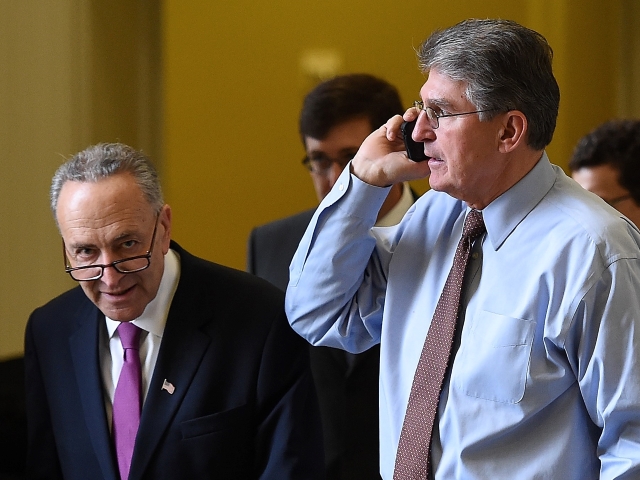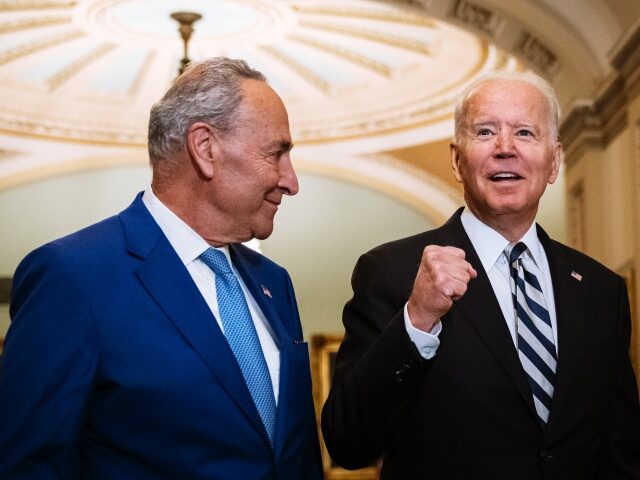The decline in consumer price inflation in July was widely celebrated in financial markets and the White House, but it did little to deter lawmakers from enacting the Inflation Reduction Act this week.
That’s probably because the bill is not really aimed at reducing inflation. It is a tax and spending bill that subsidizes Democratic priorities on climate change and health, paid for with tax hikes. Over 10 years it is expected to reduce the budget deficit, which economists say could put downward pressure on inflation. But most of that reduction does not take place until 2027 through 2031, long after the Federal Reserve projects it will have brought inflation back down to its two percent target.
The Penn Wharton Budget Model’s analysis of the original version of the bill found that the Inflation Reduction Act actually raised inflation slightly over the first few years. This is because the bill’s spending increases would push up demand while its tax hikes on corporations and wealthy individuals would do very little to quell demand. As economists would put it, the spending and subsidies will have high multipliers while the tax hikes have low multipliers, largely because the tax increases are not expected to have a large effect on the spending of wealthy individuals and large corporations.

Sen. Charles Schumer (D-NY) passes Sen. Joe Manchin (D-WV) at the U.S. Capitol November 13, 2014, in Washington, DC. (Win McNamee/Getty Images)
On Friday the Penn Wharton Budget Model (PWBM) released its analysis of the revamped version of the bill. Spoiler alert: it still does not reduce inflation.
“PWBM estimates that the Senate-passed version of the Inflation Reduction Act would reduce non-interest cumulative deficits by $264 billion over the budget window. The impact on inflation is statistically indistinguishable from zero,” the summary of the report explained.
The analysis found that there was no effect at all on inflation in the near term—which is when inflation reduction would actually do some good. Five years or so from now, the model shows inflation falling by 0.1 percent—an effect so small that the report says it is “indistinguishable from zero.”
The model estimates the bill will reduce cumulative noninterest deficits by $264 billion over the next ten years. That is equivalent to less than 0.1 percent of Gross Domestic Product. For comparison, the 2021 Biden stimulus that fueled our current inflation mess spent $1.9 trillion, or eight percent of GDP. The bill included extensions of tax credits that are unlikely to be allowed to expire. According to the Center for a Responsible Budget, making those tax credits permanent or extending them continuously for the next decade would raise the total cost of Biden’s stimulus to $3.8 trillion through 2031. If you count the interest on the debt incurred to spend that much, the bill comes to $4.1 trillion.
The Wall Street Journal‘s Greg Ip pointed out on Thursday that the deficit reduction in the bill is also more than offset by the other spending bills Biden has signed into law. The bipartisan expansion of veterans’ benefits Biden signed this week will add an estimated $278 billion to deficits over the next ten years, according to the Congressional Budget Office (CBO). Last year’s infrastructure spending legislation is expected by the CBO to add another $257 billion. The law aimed at boosting domestic semiconductor manufacturing is scored as adding $79 billion. As the headline on Ip’s story points out, “Biden’s Agenda Doesn’t Give Priority to Inflation, Despite Rhetoric.”
In its new analysis, the Penn Wharton Model finds once again that the Inflation Reduction Act will put a very small amount of upward pressure on prices next year and the year after that. Even the “statistically indistinguishable from zero” downward pressure on inflation goes away after 2028.
Feeding Food Back Into Inflation
In Thursday’s Breitbart Business Digest, we discussed the big impact food prices have on consumer expectations for inflation. Survey data show that consumers base their outlook on inflation largely on the price changes they observe while shopping for groceries. Household goods that are purchased frequently—like milk and bread—have much bigger impacts than bigger ticket items, which are given more weight in the official inflation statistics, a 2019 study found.
As it turns out, the public is on to something. In 2002, a pair of economists from the Federal Reserve Bank of St. Louis compared various inflation measures to see how well they predicted future inflation. What they found was that food inflation is a better predictor of inflation a year out than so called “core inflation” that excludes food and fuel. It turns out that the exclusion of food from core inflation is a remnant from a time when food prices were much more volatile and idiosyncratic. Advances in transportation and refrigeration, the growth of big grocery chains, and increased international trade in food have made food prices less volatile and more likely to reflect broader trends in the economy.

“With the decreased volatility in food prices and their ability to predict future inflation, it no longer makes sense to exclude food from our measure of core inflation. Too much valuable information is lost with the exclusion of food from the core” inflation, the economists argue.
Last month, food plus core—or foodcore— inflation rose 0.4 percent and was up 6.6 percent year over year. This indicates there’s likely a lot more inflation in our future.

COMMENTS
Please let us know if you're having issues with commenting.